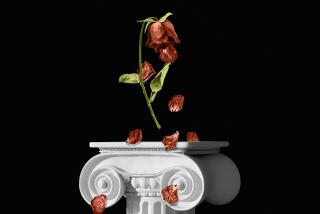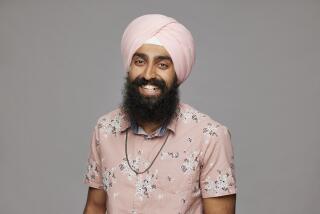Turning a lens on Serbian nationalism
BELGRADE, SERBIA — It didn’t take long for voters to eject Burek from the house in Serbia’s version of the “Big Brother” reality TV show.
A Serb from the distant (and disputed) province of Kosovo, Burek was clearly seen as a country bumpkin. He ate hot dogs and pickles for breakfast, he crassly tried to hit on women in the house, and his bathroom habits were, well, a little on the rudimentary side.
“Everything about him stinks of primitivism,” one viewer wrote in a long-running Internet chat room that focused on the show -- and particularly on Burek, whose real name is Zivan Janicijevic and whose nickname is the word for a greasy cheese pastry.
So much for “Only Unity Can Save the Serbs,” the battle cry of Serbian nationalists for generations: Burek, by popular vote, was unceremoniously evicted a few weeks into the program.
And then there was Elmir Kuduzovic: of all things, a Bosnian Muslim, who joined the housemates shortly before Burek was ousted. Elmir, it turns out, was something of a hit. Good-looking and macho, he got rave reviews.
“Women adore him,” one fan wrote. “You can see he’s cool. A little rough around the edges, but a true man.”
In rejecting fellow Serb Burek and maintaining Muslim Elmir, the viewers of this Belgrade-produced television program were drawn somewhat tentatively into a debate about national identity and social prejudice.
The program managed (probably inadvertently) to bring exposure to issues, such as the lives of Kosovo Serbs, that do not normally penetrate mass culture in today’s truncated, dispirited Serbia.
(Ultimately, the show ended abruptly and tragically when the popular Elmir and two former housemates were killed in a car wreck just days before the winner was to be chosen. The three were traveling along icy roads to a big year-end party that got its cachet from having “celebrities” from the show in attendance.)
Serbia is all that remains of what was once Yugoslavia; the other Yugoslav republics, including Bosnia-Herzegovina and Croatia, split off to become their own countries following devastating civil wars; and Kosovo, where Serbian forces in 1999 fought ethnic Albanians backed by NATO, is expected to bolt soon as well. Even tiny Montenegro has seceded.
Dragan Ilic, a psychologist who serves as a commentator on “Big Brother” for the B-92 network that broadcasts it, said the show forces viewers to confront uncomfortable realities.
“It exposes the worst in people -- that’s why it’s good,” Ilic said. “It opened us to problems of society, a lot of prejudices, even political problems, although politics are not allowed.”
That’s one of the rules: no politics. But politics creep in.
The setup of “Serbian Big Brother” (“Veliki Brat”) is identical to the versions aired in dozens of other countries: Contestants are confined to a house, given tasks, provoked into doing ridiculous things, all for the hope of money and a bit of fame.
Ilic said the producers’ decision to include the odd Bosnian, Croat and Montenegrin as housemates was not a gesture of altruistic brotherhood but a business decision. The producers wanted to appeal to viewers throughout the former Yugoslavia, where the program is also sold and broadcast.
Officials from the Emotion Co., which produces “Big Brother,” declined requests for an interview.
The success of the wildly popular show is in presenting the housemates without ideological or cultural baggage, “above reality,” said sociologist Zorica Tomic, the host of a top-rated talk show.
“It’s a kind of bonding . . . that we don’t have in the real world,” Tomic said.
The show even spawned a Romeo-and-Juliet-style romance in its first season last year, between Edin, a Muslim from the Bosnian capital, Sarajevo; and Maja, a Serb from the Serbian city of Nis. It didn’t last; they couldn’t agree on which country to live in.
But no contestant has generated as much debate and mostly snarly criticism as Burek, 26, a high school graduate with heavy eyebrows, slightly buck teeth and an unshaven mug.
“Now I can see what Serbia is reduced to,” a viewer named Misha wrote. “They brought a peasant into the house. Terrible!”
“Such a simple man,” wrote another. “The prejudices about people from Kosovo prove to be true -- their intelligence is quite low.”
But Burek also had defenders, people who gave him credit for at least being “natural.” “Just because he’s from a village in Kosovo, that’s nothing to be ashamed of,” said a viewer calling himself Jeddah. And: “You can’t draw conclusions about all Kosovo Serbs from one Burek.”
As that debate raged, Burek and Elmir, the Bosnian Muslim, tangled on the air. Elmir teased Burek about his real first name, Zivan, asking if it was common “among Albanians.” Ethnic Albanians are the overwhelmingly dominant group in Kosovo, dwarfing a community of Kosovo Serbs such as Burek, and are demanding independence. It was quite an insult.
Burek retorted that Kosovo will always be Serbian. He looked ready to throw a few punches, before cooler heads prevailed.
Ilic, the psychologist, said ordinary Serbs had learned more about their Kosovo brethren in a few months of “Serbian Big Brother” than in years of political rhetoric, especially when television cameras traveled to Burek’s hometown and interviewed his neighbors. Although Serbs, almost universally, hail Kosovo as the medieval cradle of their religion and culture, few have actually spent time there.
“For the average Serb, a Kosovo Serb is like a dodo bird,” Ilic said. “This is the first time the life of common Kosovo Serbs was visible to the wider Serb audience.”
Eventually, Burek’s rube charm wore thin, and his enemies grew. Especially as he boasted of a masculine prowess not at all in evidence. “Girls are fired up for me, like a microwave,” he preened before the omnipresent cameras.
Burek got the boot early in the season. But he also got a bit of vindication: Under a rule that allows viewers to reinstate an evicted housemate, Burek was brought back a couple of weeks ago. To the astonishment of many.
--
--
Special correspondent Zoran Cirjakovic contributed to this report.
More to Read
The complete guide to home viewing
Get Screen Gab for everything about the TV shows and streaming movies everyone’s talking about.
You may occasionally receive promotional content from the Los Angeles Times.







